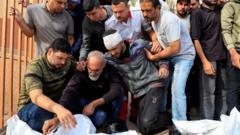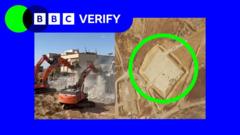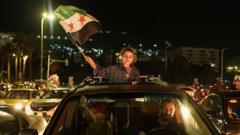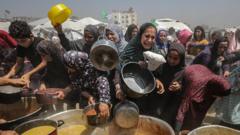The Rapid Support Forces (RSF) have initiated a series of drone strikes targeting key infrastructure in Port Sudan, marking a new phase in Sudan’s civil war after substantial losses in Khartoum. These unprecedented attacks highlight a shift to advanced drone warfare, raising regional security concerns and complicating humanitarian efforts amid the escalating conflict.
Escalating Drone Warfare Signals New Tactics in Sudan's Civil Conflict
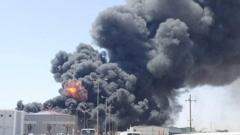
Escalating Drone Warfare Signals New Tactics in Sudan's Civil Conflict
Recent drone attacks in Sudan, particularly in Port Sudan, signal a dramatic shift in the ongoing civil war, raising concerns about humanitarian impacts and regional security.
The landscape of the Sudanese civil war has dramatically transformed with the emergence of drone warfare, particularly evident in the recent series of attacks on Port Sudan. Once regarded as a relatively stable area amidst ongoing chaos, the city has been thrust into a battleground due to targeted strikes carried out by the Rapid Support Forces (RSF), a paramilitary group battling the Sudanese Armed Forces (SAF).
Experts refer to these drone assaults—characterized as a "shock and awe campaign"—as a tactical shift. Just weeks after the SAF regained control of Khartoum, the RSF has responded by utilizing drones to target critical infrastructure, disrupting power availability and creating water shortages for residents. Alan Boswell, a Horn of Africa expert, notes that this escalation of power projection represents a pivotal point in the conflict, considerably raising the stakes.
This phase of the war reflects not only strategic shifts but also the increasing sophistication of drone technology in Africa's conflict landscape. The RSF, having adapted its tactics due to territorial losses, appears undeterred in continuing its fight, launching drones against key targets in the region. As air power dynamics shift, the RSF’s drone capabilities suggest a newfound ability to project military influence far beyond its immediate operational zone.
The RSF's drone tactics represent a strategic pivot toward remote warfare, one that aims to disrupt government control, especially in Port Sudan, which has served as a sanctuary for government officials, foreign diplomats, and humanitarian agencies. The paramilitary group’s intention seems clear: to convey a message that even in defeat, the RSF retains considerable power and influence.
Despite limited direct communication about the recent strikes, the RSF has accused the SAF of committing war crimes and receiving support from foreign nations, notably accusing Iran of supplying arms. Claims of war crimes have been exchanged by both sides, with the RSF facing particularly severe allegations, including mass atrocities.
Recent reports indicate that the RSF has deployed loitering drones, capable of conducting coordinated strikes, exemplifying a technological advancement in their military operations. The implication is clear—the utilization of these drones not only enhances their operational capacity but also reinforces a narrative of resilience against significant setbacks.
The RSF's use of drone strikes marks a departure from traditional ground assaults, essentially establishing them as a formidable presence capable of affecting national narratives. Their inclination to target civilian infrastructure in SAF-controlled territories underscores a sustained intent to destabilize the status quo.
Complicating the conflict further are foreign entities potentially implicated in supplying weaponry to both sides. The UAE has faced accusations of providing drones to the RSF, claims that have been firmly denied by Abu Dhabi. Conversely, it has been suggested that Iran may offer military support to the SAF, highlighting an intricate web of geopolitical interests diverging within the Sudanese conflict.
As humanitarian crises deepen, the UN has raised alarms over the implications of these drone attacks on aid operations, with concerns that escalating violence could exacerbate civilian casualties and displacements. Observers are noting parallels to global conflicts where drone warfare has redefined military engagements, emphasizing a shift towards more technologically driven methods of warfare that once belonged to state militaries.
The recent attacks on Port Sudan have rattled both national security and regional stability, drawing international scrutiny and raising questions about the future of Sudan’s civil war. As foreign powers continue to play a role, experts emphasize the need for diplomatic resolutions to avert prolonged conflict, underlining that without significant intervention, the situation might persist for years to come.

